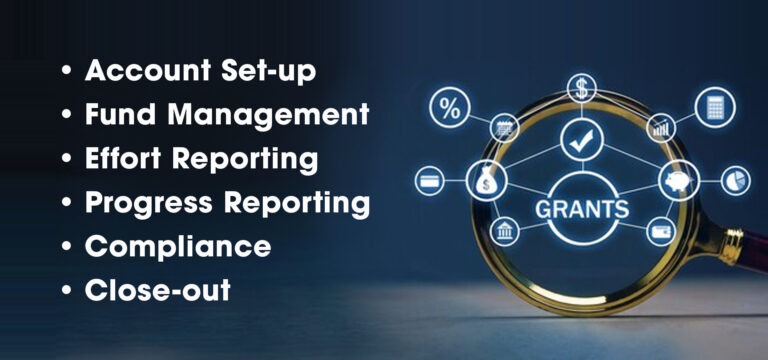
Effective post-award grant management is essential for ensuring compliance with funding requirements and achieving project goals. It involves monitoring expenditures, maintaining accurate records, submitting timely reports, and communicating regularly with stakeholders. Proper management helps maximize the impact of the grant and sets the stage for future funding opportunities.
For details on the Post-Award process please contact Jessica Gustke at gustkeje@udmercy.edu | (313) 993-1297
The post award phase comprises a significant amount of work over the duration of the award dates, which includes implementing the grant, reporting progress, and completing the closeout requirements. The federal agency that makes the award to you is also there to assist and ensure you or your organization complies with the grant terms and conditions. Your job is to faithfully and diligently carry out the grant program.
The awarding agency monitors your progress and expenditures through various programmatic and financial reporting procedures, as well as using performance metrics per the grant agreement. While the majority of award recipients carry out the grants ethically and efficiently, these monitoring procedures are necessary to maintain transparency and to prevent fraud and abuse.
The awarding agency typically has a grants management officer and program officer designated to each grant, both of which you will work with throughout the life of the grant. They are the ones who will review reports and conduct site visits, so we recommend you build an effective line of communication with these staff members. It is better to prevent issues by talking to your grant and program officers to clarify grant terms or expectations than it is to submit a report and wait for problems to be identified and recourse initiated.
The specific reporting requirements, schedules, and systems can vary for each grant, so please review the grant terms and conditions carefully for this information. Check out the Grants.gov Grant Systems section to learn more about the systems you may have to use and where to find more information about them.
The PI and PACGA will work together throughout the grant term to ensure all expenses related to the grant are recorded in the designated FOAP for accurate financial and compliance reporting
Effort reporting is a critical component of managing federal grants. It involves documenting the percentage of time and effort that faculty and staff dedicate to federally funded projects. This process ensures compliance with federal regulations and verifies that the funds are being used appropriately.
Federal grants often come with stringent requirements for effort reporting to maintain transparency and accountability. Accurate effort reporting helps institutions demonstrate that the work being performed aligns with the grant’s objectives and that the personnel costs charged to the grant are justified.
Understanding and adhering to effort reporting guidelines is essential for successful grant management and for avoiding potential audit issues or financial penalties.
Federal grant-making agencies and grant recipients are audited. The Government Accountability Office (GAO), Office of Inspector General (OIG), and various departments within each Federal agency monitor and analyze policies, expenditures, and more activities within each grant-making agency. These same entities, as well as others, also monitor and analyze the performance of grant recipients.
A non-Federal entity that expends $750,000 or more in Federal awards during its fiscal year may be required to have a single audit conducted for that year. This audit is in lieu of any financial audit of Federal awards, which a non-Federal entity is required to undergo under any other Federal statute or regulation. After completion of the audit, the non-Federal entity submits the audit reporting package to the FAC within nine months after the end of the audit period. The non-Federal entity also performs follow-up and corrective action on all audit findings.
The Federal awarding agency ensures non-Federal entities have a single audit conducted and submit a single audit reporting package to the Federal Audit Clearinghouse (FAC) in a timely manner. The Federal awarding agency also performs follow-up on audit findings to ensure the non-Federal entity takes appropriate and timely corrective action. As part of this process, the Federal awarding agency issues a management decision, within six months of FAC acceptance of the audit report, for audit findings that relate to Federal awards it makes to non-Federal entities.
The closeout step is where the grant process ends. In order to complete a closeout, you, the award recipient, must submit the final financial and programmatic reports. According to the OMB Uniform Grants Guidance §200.343, the receipt must submit all financial, performance, and other reports required under the grant within 90 days after the grant award expires or is terminated. The awarding agency will review these reports to ensure compliance will all the grant terms and conditions as well as to make sure you spent all the funds appropriately.
How do I know when a grant is officially over? The Federal awarding agency has to confirm that the recipient has completed all of the required grant work and all the applicable administrative tasks. Until the awarding agency confirms this, you are still responsible for fulfilling all the terms of the grant. The closeout process can take several months if there are financial concerns or questions to reconcile. Also, if you or your organization acquired any property using grant funding, the closeout step is when you must make sure to handle this property exactly as the grant stipulates, which includes completing the appropriate reports on this property. Lastly, you are typically required to retain your grant records for at least three years from the date of the final expenditure report.
Jessica Gustke
Post Award Grants & Contracts Administrator
gustkeje@udmercy.edu
(313) 993-1297
Required Forms/Templates

Working with OSPRA from project concept through award has significantly increased my awareness and understanding of the processes and UDM policies.
OSPRA offers a series of workshops throughout the academic year. Browse the workshop schedule and register today.
OSPRA Workshops offer the perfect opportunity to lean more about the sponsored research activities at UDM and gain an understanding of the process and policies. Register today.